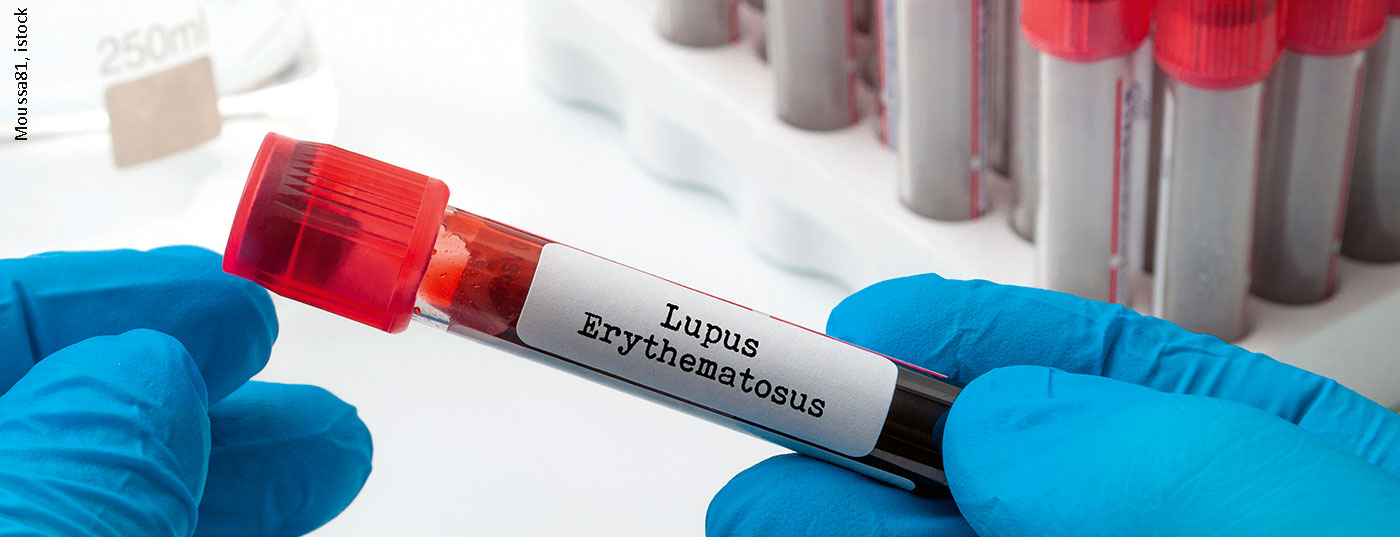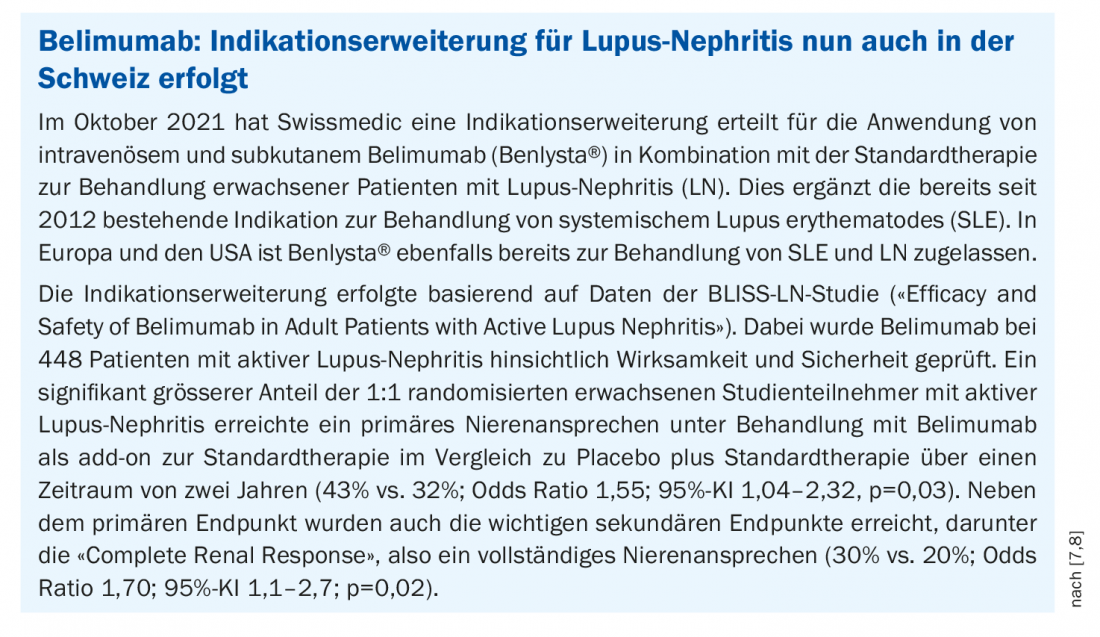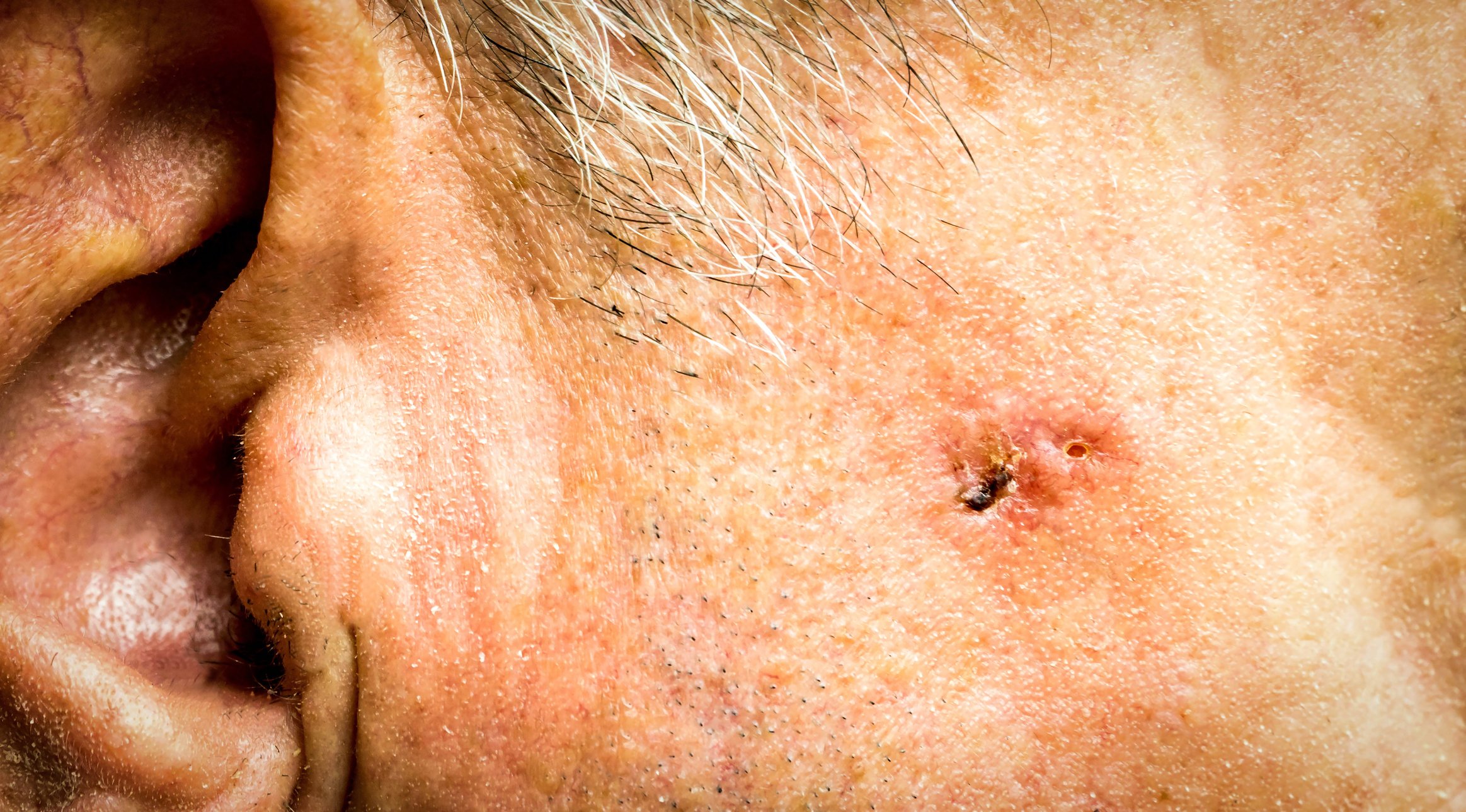Systemic lupus erythematosus (SLE) carries a high risk of life-threatening organ damage, but there is new hope for sufferers. In recent years, the development of innovative treatment options has been advanced. Novel immunotherapies for severe courses have shown promise in case studies. In addition, the indication expansion of belimumab for lupus nephritis was a significant milestone, as renal involvement is among the most severe organ manifestations of SLE.
The prevalence of systemic lupus erythematosus (SLE) in our latitudes is approximately 35:100 000 [1]. Women are about nine times more likely to develop the disease than men, and it mostly affects the age group from 16 to 55 years. An SLE disease flare is often accompanied by fever, fatigue, joint and muscle pain. If left untreated, the inflammatory processes of a lupus disease can cause long-term damage to the skin, lungs, kidneys, heart or even blood vessels and nerves. There is a lot going on in the field of therapy research. On the occasion of the annual meeting of the German Society of Rheumatology (DGRh), current findings of pioneering projects in the field of immunotherapies were presented [1].
B lymphocytes and plasma cells, which produce antibodies directed against the body, are of central importance in the disease process of SLE. Such cells also play a role in certain malignant blood diseases. “For this reason, researchers have been using targeted therapies from blood cancer research on an experimental basis in particularly severe cases for several years now,” explains Prof. Christof Specker, MD, Vice President of the DGRh [1]. Specifically, one is CD38 as a target of daratumumab and the other is CAR- T cells directed against CD19 [2,3].
CAR-T cells: successfully used against lupus for the first time
A severe, refractory course of SLE can be very distressing for those affected. New therapeutic approaches are needed for lupus patients whose disease cannot be controlled with the available treatment options. In a 2021 publication by an Erlangen research group led by Prof. Georg Schett, MD, Prof. Bernhard Manger, MD, and Prof. Gerhard Krönke, MD, it was shown that chimeric antigen receptor T (CAR-T) cells directed against the CD19 protein on B lymphocytes could bring active, refractory systemic lupus erythematosus into sustained serological and clinical remission [3]. In recent years, this highly innovative therapy has been clinically investigated mainly for the treatment of selected cases of malignant hematologic diseases and has already been successfully used in refractory B-cell malignancies. In this process, T cells taken from a patient outside the body by leukapheresis are genetically modified in such a way that they cause targeted cytolysis of malignant B lymphocytes and plasma cells after reinfusion into the body. CAR-T cells even continue to proliferate in the body, making them a highly effective and sustainable therapy. But the procedure is very complex and also carries the risk of side effects. Therefore, it has so far only been offered in university hematology centers.
The world’s first use of this CAR T-cell therapy was particularly successful in a 20-year-old SLE patient at the German Center for Immunotherapy at the Friedrich Alexander University of Erlangen-Nuremberg. The patient suffered from active lupus nephritis, nephrotic syndrome, pericarditis, pleurisy, skin rash, and arthritis, among others [4]. Previous therapies with hydroxychloroquine, high-dose glucocorticoids, cyclophosphamide, mycophenolate mofetil, tacrolimus, and anti-B-cell antibody therapies failed to control the patient’s symptoms. Therefore, experimental CD19-modified CAR-T cell therapy was applied, resulting in complete and long-lasting destruction of circulating B cells, disease symptoms remitted, and immunological SLE changes in blood normalized [4]. No serious undesirable side effects occurred.
Daratumumab: CD38 effective as a target in individual cases
A Berlin-based research group led by Prof. Gerd Burmester, MD, Prof. Falk Hiepe, MD, and Tobias Alexander, MD, investigated the anti-CD38 monoclonal antibody daratumumab in two female lupus patients who had not responded well to conventional therapies [2]. Daratumumab reduces the number of plasma cells and has been used successfully for years as a drug for plasma cell cancers. In both patients, the lupus disease had taken a life-threatening course. Among other things, they suffered from inflammation of the heart and kidneys and anemia caused by antibodies. Treatment with daratumumab (1×/week) for one month significantly improved the disease symptoms within a short period of time and remained stable for several months; moreover, the number of autoantibodies decreased sharply [5]. Using state-of-the-art immunological methods – including single cell sequencing – a beneficial effect of daratumumab on activated T-lymphocytes, which are thought to play an important role in disease development, was also demonstrated. Relevant side effects did not occur. Although there was a drop in protective antibodies in the blood, this was not associated with increased susceptibility to infection. “These new therapeutic approaches are very promising, but so far they have only proven successful in isolated cases,” emphasizes Prof. Andreas Krause, MD, President of the German Society of Rheumatology. It remains to be seen how these costly and not low-risk therapies will prove themselves in larger studies and in a long-term perspective.
In addition to these currently investigational treatment strategies, the expansion of the indication for belimumab (Benlysta®) for patients with lupus nephritis has also expanded the range of approved therapies (box) [6,7].
Congress: DGRh Annual Meeting 2021
Literature:
- “Innovative therapies against autoimmune disease show promise,” German Society of Rheumatology (DGRh), Sept. 07, 2021.
- Ostendorf L, et al: Targeting CD38 with Daratumumab in Refractory Systemic Lupus Erythematosus. New England Journal of Medicine 2020; 383(12): 1149-1155.
- “Plasma cells in the focus of a novel therapeutic approach,” Charité Universitätsmedizin Berlin, Sept. 22, 2020.
- Mougiakakos D, et al: CD19-Targeted CAR T Cells in Refractory Systemic Lupus Erythematosus. New England Journal of Medicine 2021; 385(6): 567-569.
- Dingermann T: CAR T-cell therapy helps in severe lupus erythematosus. Pharmeceutical Newspaper, 11.08.2021
- Drug information, Benlysta®, www.swissmedicinfo.ch, last accessed 04.11.2021
- “Belimumab now approved for the treatment of lupus nephritis,” GlaxoSmithKline (GSK), October 2021.
- Furie R, et al: Two-Year, Randomized, Controlled Trial of Belimumab in Lupus Nephritis. New England Journal of Medicine 2020; 383(12): 1117-1128.
HAUSARZT PRAXIS 2021; 16(11): 30-31 (published 11/14-21, ahead of print).
InFo PAIN & GERIATURE 2021; 3(2): 42-43.












